省略句+练习
- 格式:doc
- 大小:61.50 KB
- 文档页数:22
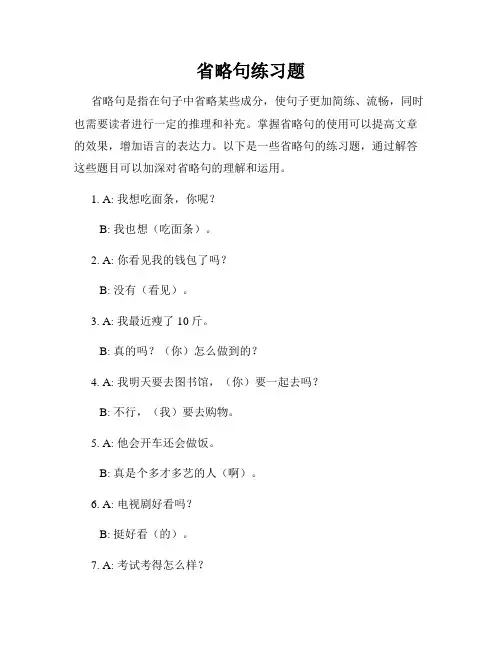
省略句练习题
省略句是指在句子中省略某些成分,使句子更加简练、流畅,同时也需要读者进行一定的推理和补充。
掌握省略句的使用可以提高文章的效果,增加语言的表达力。
以下是一些省略句的练习题,通过解答这些题目可以加深对省略句的理解和运用。
1. A: 我想吃面条,你呢?
B: 我也想(吃面条)。
2. A: 你看见我的钱包了吗?
B: 没有(看见)。
3. A: 我最近瘦了10斤。
B: 真的吗?(你)怎么做到的?
4. A: 我明天要去图书馆,(你)要一起去吗?
B: 不行,(我)要去购物。
5. A: 他会开车还会做饭。
B: 真是个多才多艺的人(啊)。
6. A: 电视剧好看吗?
B: 挺好看(的)。
7. A: 考试考得怎么样?
B: 考得不错(啊)。
8. A: 今天的天气好热啊。
B: 是啊,(真)让人受不了(啊)。
9. A: 请你帮我拿杯水好吗?
B: 可以(的)。
10. A: 我不喜欢吃肉。
B: 我也(不喜欢吃肉)。
以上是关于省略句的练习题,通过这些简单的对话句子可以深入理解和掌握省略句的用法。
在实际写作中,我们也可以灵活地运用省略句,简练而不失完整的句子能够提高文章的可读性和表达力。
所以,多加练习,不断熟悉和运用省略句的正确方式,将会对我们的写作水平有所提高。
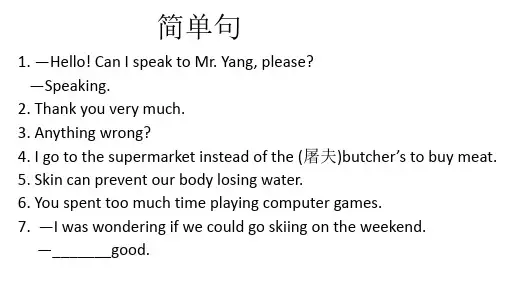
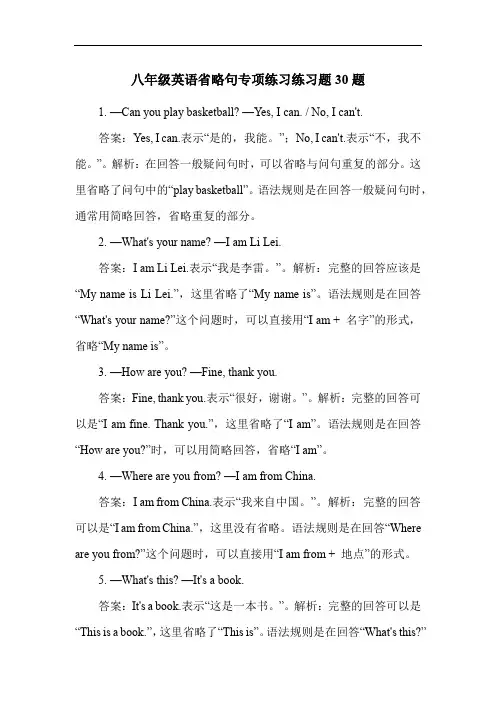
八年级英语省略句专项练习练习题30题1. —Can you play basketball? —Yes, I can. / No, I can't.答案:Yes, I can.表示“是的,我能。
”;No, I can't.表示“不,我不能。
”。
解析:在回答一般疑问句时,可以省略与问句重复的部分。
这里省略了问句中的“play basketball”。
语法规则是在回答一般疑问句时,通常用简略回答,省略重复的部分。
2. —What's your name? —I am Li Lei.答案:I am Li Lei.表示“我是李雷。
”。
解析:完整的回答应该是“My name is Li Lei.”,这里省略了“My name is”。
语法规则是在回答“What's your name?”这个问题时,可以直接用“I am + 名字”的形式,省略“My name is”。
3. —How are you? —Fine, thank you.答案:Fine, thank you.表示“很好,谢谢。
”。
解析:完整的回答可以是“I am fine. Thank you.”,这里省略了“I am”。
语法规则是在回答“How are you?”时,可以用简略回答,省略“I am”。
4. —Where are you from? —I am from China.答案:I am from China.表示“我来自中国。
”。
解析:完整的回答可以是“I am from China.”,这里没有省略。
语法规则是在回答“Where are you from?”这个问题时,可以直接用“I am from + 地点”的形式。
5. —What's this? —It's a book.答案:It's a book.表示“这是一本书。
”。
解析:完整的回答可以是“This is a book.”,这里省略了“This is”。
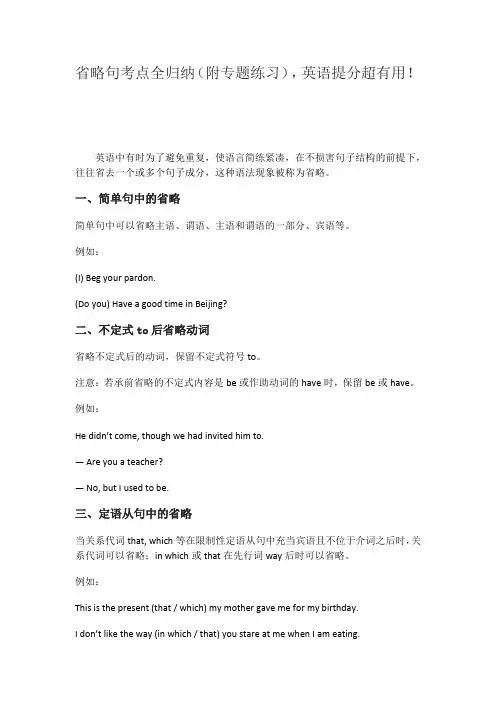
省略句考点全归纳(附专题练习),英语提分超有用!
英语中有时为了避免重复,使语言简练紧凑,在不损害句子结构的前提下,往往省去一个或多个句子成分,这种语法现象被称为省略。
一、简单句中的省略
简单句中可以省略主语、谓语、主语和谓语的一部分、宾语等。
例如:
(I) Beg your pardon.
(Do you) Have a good time in Beijing?
二、不定式to后省略动词
省略不定式后的动词,保留不定式符号to。
注意:若承前省略的不定式内容是be或作助动词的have时,保留be或have。
例如:
He didn’t come, though we had invited him to.
— Are you a teacher?
— No, but I used to be.
三、定语从句中的省略
当关系代词that, which等在限制性定语从句中充当宾语且不位于介词之后时,关系代词可以省略;in which或that在先行词way后时可以省略。
例如:
This is the present (that / which) my mother gave me for my birthday.
I don’t like the way (in which / that) you stare at me when I am eating.。
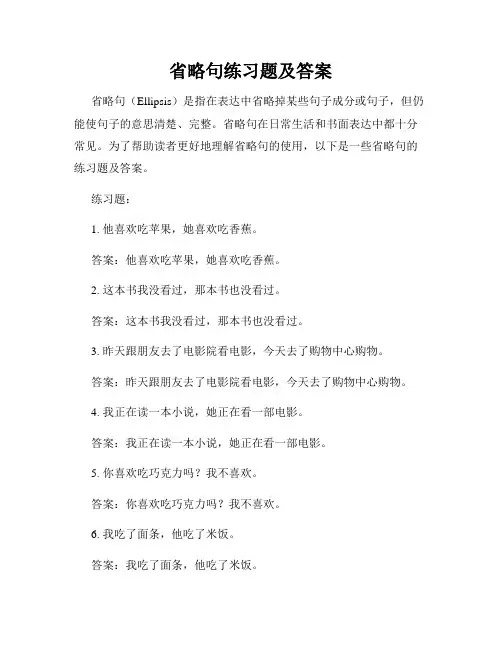
省略句练习题及答案省略句(Ellipsis)是指在表达中省略掉某些句子成分或句子,但仍能使句子的意思清楚、完整。
省略句在日常生活和书面表达中都十分常见。
为了帮助读者更好地理解省略句的使用,以下是一些省略句的练习题及答案。
练习题:1. 他喜欢吃苹果,她喜欢吃香蕉。
答案:他喜欢吃苹果,她喜欢吃香蕉。
2. 这本书我没看过,那本书也没看过。
答案:这本书我没看过,那本书也没看过。
3. 昨天跟朋友去了电影院看电影,今天去了购物中心购物。
答案:昨天跟朋友去了电影院看电影,今天去了购物中心购物。
4. 我正在读一本小说,她正在看一部电影。
答案:我正在读一本小说,她正在看一部电影。
5. 你喜欢吃巧克力吗?我不喜欢。
答案:你喜欢吃巧克力吗?我不喜欢。
6. 我吃了面条,他吃了米饭。
答案:我吃了面条,他吃了米饭。
7. 他喜欢在家看电视,我喜欢出去玩。
答案:他喜欢在家看电视,我喜欢出去玩。
8. 昨天我在图书馆看书,她在咖啡店喝咖啡。
答案:昨天我在图书馆看书,她在咖啡店喝咖啡。
9. 你想喝茶还是咖啡?我想喝咖啡。
答案:你想喝茶还是咖啡?我想喝咖啡。
10. 她是个医生,他是个律师。
答案:她是个医生,他是个律师。
答案解析:以上练习题中,答案部分都是省略掉了重复的句子或句子成分,以保持句意的完整和流畅。
在口语和书面表达中,为了避免重复,省略句是常用的表达方式。
需要注意的是,省略句的使用要在语境清晰、句意明确的前提下进行。
如果省略过度或造成歧义,会给读者带来困惑,影响信息的传达。
因此,在运用省略句时,要注意上下文的连贯性和语境的准确性。
总结:省略句作为一种常见的表达方式,能够简化语言,提高句子的简洁性和流畅性。
通过练习和实践,我们可以更加灵活地运用省略句,以达到更清晰、简洁的表达效果。
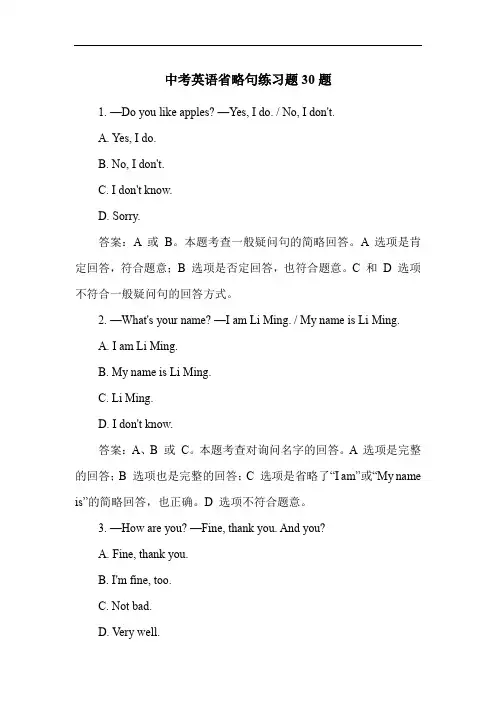
中考英语省略句练习题30题1. —Do you like apples? —Yes, I do. / No, I don't.A. Yes, I do.B. No, I don't.C. I don't know.D. Sorry.答案:A 或B。
本题考查一般疑问句的简略回答。
A 选项是肯定回答,符合题意;B 选项是否定回答,也符合题意。
C 和D 选项不符合一般疑问句的回答方式。
2. —What's your name? —I am Li Ming. / My name is Li Ming.A. I am Li Ming.B. My name is Li Ming.C. Li Ming.D. I don't know.答案:A、B 或C。
本题考查对询问名字的回答。
A 选项是完整的回答;B 选项也是完整的回答;C 选项是省略了“I am”或“My name is”的简略回答,也正确。
D 选项不符合题意。
3. —How are you? —Fine, thank you. And you?A. Fine, thank you.B. I'm fine, too.C. Not bad.D. Very well.答案:A、B、C 或D。
本题考查问候语“How are you?”的回答。
四个选项都是常见的回答方式,A 选项是完整的回答;B 选项是对“And you?”的回答;C 和D 选项也都是常见的简略回答。
4. —Nice to meet you! —Nice to meet you, too!A. Nice to meet you!B. Nice to meet you, too!C. Glad to see you!D. See you later!答案:B。
本题考查初次见面时的问候语的回应。
A 选项是问候语本身,不是回应;C 选项虽然也是问候语,但不是对“Nice to meet you!”的回应;D 选项是告别语。
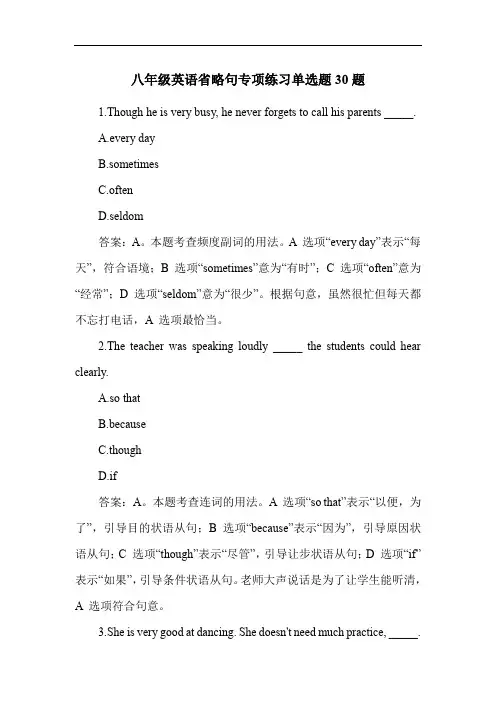
八年级英语省略句专项练习单选题30题1.Though he is very busy, he never forgets to call his parents _____.A.every dayB.sometimesC.oftenD.seldom答案:A。
本题考查频度副词的用法。
A 选项“every day”表示“每天”,符合语境;B 选项“sometimes”意为“有时”;C 选项“often”意为“经常”;D 选项“seldom”意为“很少”。
根据句意,虽然很忙但每天都不忘打电话,A 选项最恰当。
2.The teacher was speaking loudly _____ the students could hear clearly.A.so thatB.becauseC.thoughD.if答案:A。
本题考查连词的用法。
A 选项“so that”表示“以便,为了”,引导目的状语从句;B 选项“because”表示“因为”,引导原因状语从句;C 选项“though”表示“尽管”,引导让步状语从句;D 选项“if”表示“如果”,引导条件状语从句。
老师大声说话是为了让学生能听清,A 选项符合句意。
3.She is very good at dancing. She doesn't need much practice, _____.A.tooB.alsoC.eitherD.neither答案:C。
本题考查“也”的用法。
A 选项“too”常用于肯定句句末,用逗号隔开;B 选项“also”常用于句中;C 选项“either”用于否定句句末;D 选项“neither”通常与nor 连用,构成“neither...nor...”结构。
本句是否定句,C 选项正确。
4.If you don't go to the party, I won't go, _____.A.tooB.eitherC.alsoD.neither答案:B。
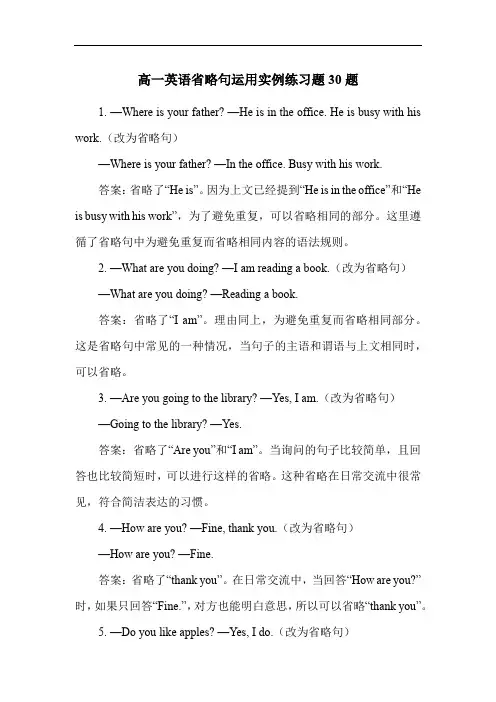
高一英语省略句运用实例练习题30题1. —Where is your father? —He is in the office. He is busy with his work.(改为省略句)—Where is your father? —In the office. Busy with his work.答案:省略了“He is”。
因为上文已经提到“He is in the office”和“He is busy with his work”,为了避免重复,可以省略相同的部分。
这里遵循了省略句中为避免重复而省略相同内容的语法规则。
2. —What are you doing? —I am reading a book.(改为省略句)—What are you doing? —Reading a book.答案:省略了“I am”。
理由同上,为避免重复而省略相同部分。
这是省略句中常见的一种情况,当句子的主语和谓语与上文相同时,可以省略。
3. —Are you going to the library? —Yes, I am.(改为省略句)—Going to the library? —Yes.答案:省略了“Are you”和“I am”。
当询问的句子比较简单,且回答也比较简短时,可以进行这样的省略。
这种省略在日常交流中很常见,符合简洁表达的习惯。
4. —How are you? —Fine, thank you.(改为省略句)—How are you? —Fine.答案:省略了“thank you”。
在日常交流中,当回答“How are you?”时,如果只回答“Fine.”,对方也能明白意思,所以可以省略“thank you”。
5. —Do you like apples? —Yes, I do.(改为省略句)—Like apples? —Yes.答案:省略了“Do you”和“I do”。
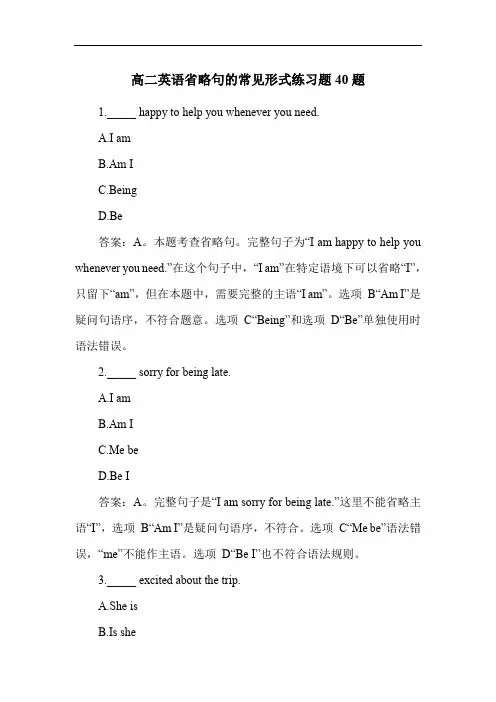
高二英语省略句的常见形式练习题40题1._____ happy to help you whenever you need.A.I amB.Am IC.BeingD.Be答案:A。
本题考查省略句。
完整句子为“I am happy to help you whenever you need.”在这个句子中,“I am”在特定语境下可以省略“I”,只留下“am”,但在本题中,需要完整的主语“I am”。
选项B“Am I”是疑问句语序,不符合题意。
选项C“Being”和选项D“Be”单独使用时语法错误。
2._____ sorry for being late.A.I amB.Am IC.Me beD.Be I答案:A。
完整句子是“I am sorry for being late.”这里不能省略主语“I”,选项B“Am I”是疑问句语序,不符合。
选项C“Me be”语法错误,“me”不能作主语。
选项D“Be I”也不符合语法规则。
3._____ excited about the trip.A.She isB.Is sheD.Be she答案:A。
完整表达为“She is excited about the trip.”不能省略主语“she”,选项B 是疑问句语序,不对。
选项C“Her be”错误,“her”不能作主语。
选项D“Be she”也不对。
4._____ worried about the exam.A.He isB.Is heC.Him beD.Be he答案:A。
“He is worried about the exam.”不能省略主语“he”,选项B 疑问句语序错误,选项C“him”不能作主语,选项D“Be he”错误。
5._____ surprised to see you here.A.We areB.Are we beD.Be we答案:A。
完整句子是“We are surprised to see you here.”不能省略主语“we”,选项 B 是疑问句语序,选项C“us”不能作主语,选项D“Be we”错误。
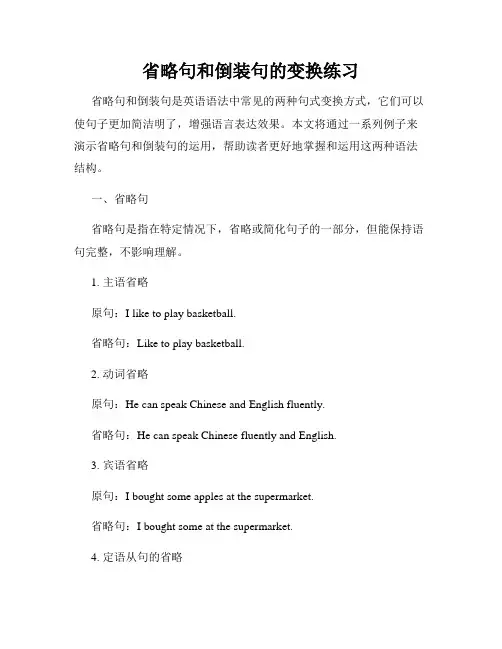
省略句和倒装句的变换练习省略句和倒装句是英语语法中常见的两种句式变换方式,它们可以使句子更加简洁明了,增强语言表达效果。
本文将通过一系列例子来演示省略句和倒装句的运用,帮助读者更好地掌握和运用这两种语法结构。
一、省略句省略句是指在特定情况下,省略或简化句子的一部分,但能保持语句完整,不影响理解。
1. 主语省略原句:I like to play basketball.省略句:Like to play basketball.2. 动词省略原句:He can speak Chinese and English fluently.省略句:He can speak Chinese fluently and English.3. 宾语省略原句:I bought some apples at the supermarket.省略句:I bought some at the supermarket.4. 定语从句的省略原句:My friend, who is from France, is a doctor.省略句:My friend, from France, is a doctor.二、倒装句倒装句是英语中常见的句子结构,即将谓语动词放在主语之前,用来强调某个部分,或表示某种特定的语气和语态。
1. 完全倒装原句:He is studying English.倒装句:Is he studying English?2. 半倒装原句:She is always late for class.倒装句:Always she is late for class.3. 否定词位于句首的倒装原句:I didn't see him at the party.倒装句:Not until the party did I see him.4. 地点状语位于句首的倒装原句:In the park, the children are playing games.倒装句:In the park, are the children playing games?通过以上的例子,我们可以看到省略句和倒装句的变换对于句子的简化和表达方式的多样化起到了重要的作用。
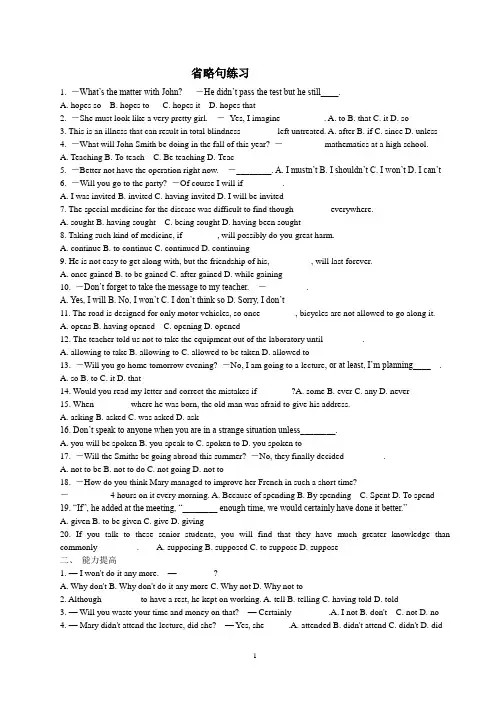
省略句练习1. -What’s the matter with John?-He didn’t pass the test but he still____.A. hopes soB. hopes toC. hopes itD. hopes that2. -She must look like a very pretty girl. -Yes, I imagine__________. A. to B. that C. it D. so3. This is an illness that can result in total blindness________ left untreated. A. after B. if C. since D. unless4. -What will John Smith be doing in the fall of this year? -_________ mathematics at a high school.A. TeachingB. To teachC. Be teachingD. Teac5. -Better not have the operation right now. -________. A. I mustn’t B. I shouldn’t C. I won’t D. I can’t6. -Will you go to the party? -Of course I will if_________.A. I was invitedB. invitedC. having invitedD. I will be invited7. The special medicine for the disease was difficult to find though________ everywhere.A. soughtB. having soughtC. being soughtD. having been sought8. Taking such kind of medicine, if _______ , will possibly do you great harm.A. continueB. to continueC. continuedD. continuing9. He is not easy to get along with, but the friendship of his, _________, will last forever.A. once gainedB. to be gainedC. after gainedD. while gaining10. -Don’t forget to take the message to my teacher. -_________.A. Yes, I willB. No, I won’tC. I don’t think soD. Sorry, I don’t11. The road is designed for only motor vehicles, so once________, bicycles are not allowed to go along it.A. opensB. having openedC. openingD. opened12. The teacher told us not to take the equipment out of the laboratory until_________.A. allowing to takeB. allowing toC. allowed to be takenD. allowed to13. -Will you go home tomorrow evening? -No, I am going to a lecture, or at least, I’m planning______.A. soB. toC. itD. that14. Would you read my letter and correct the mistakes if________?A. some B. ever C. any D. never15. When________ where he was born, the old man was afraid to give his address.A. askingB. askedC. was askedD. ask16. Don’t speak to anyone when you are in a strange situation unless________.A. you will be spokenB. you speak toC. spoken toD. you spoken to17. -Will the Smiths be going abroad this summer? -No, they finally decided_________.A. not to beB. not to doC. not goingD. not to18. -How do you think Mary managed to improve her French in such a short time?-_________ 4 hours on it every morning. A. Because of spending B. By spending C. Spent D. To spend19. “If”, he added at the meeting, “________ enough time, we would certainly have done it better.”A. givenB. to be givenC. giveD. giving20. If you talk to these senior students, you will find that they have much greater knowledge than commonly_________. A. supposing B. supposed C. to suppose D. suppose二、能力提高1. — I won't do it any more. — ________?A. Why don'tB. Why don't do it any moreC. Why notD. Why not to2. Although ________ to have a rest, he kept on working. A. tell B. telling C. having told D. told3. — Will you waste your time and money on that? — Certainly ________.A. I not B. don't C. not D. no4. — Mary didn't attend the lecture, did she? — Yes, she _____.A. attended B. didn't attend C. didn't D. did5. — What's Joan doing? -_____ newspapers in the room.A. She reading B. She reads C. To read D. Reading6. _________ always succeed. A. Honest and clever students B. Students who honest and cleverC. Honest students and cleverD. Students are honest and clever7. — Can you climb that tree, my boy? — __________ ? A. I B. Myself C. Mine D. Me8. Some people are against the plan but _______ support it.A. any moreB. many moreC. much moreD. no more9. — I'll be away on a business trip. Would you mind looking after my cat? — Not at all. _________.A. I've no timeB. I'd rather notC. I'd like toD. I'd be happy to10. — Why not go and have dinner in a restaurant? — _________. It's too expensive.A. Why notB. I agreeC. I'm afraid notD. I'm sure11. I still remember the name of the village ______we visited last year. A. what B. / C. where D. when12. — I usually go there by train. — Why not_____by boat for a change? (MET’92)A. to try goingB. trying to goC. to try and goD. try going13. —for your brother, I would not have gone to see Mr. Wang.A. If it is notB. Were it notC. Had it not beenD. If they were not14. —I’d like to have a piece of bread and two eggs.— Anything _________?A. followingB. followsC. to followD. to be followed15. He suggested that the work ________ at once. A. be done B. should do C. could do D. does16. I don’t like the way ________ you talk to your mother. A. / B. in that C. which D. of which17. I know the boy very well. I have seen him _________up from childhood.A. growB. grewC. was growingD. to grow18. Though the little boy is often made _______by his brother, he made his brother __________yesterday.A. cry;to cryB. crying;cryingC. cry;cryD. to cry;cry19. —I’ll go to Korea to watch the 14th Asian Games. Would you mind looking after my dog?— Not at all. ___________. A. I can’t B. Please don’t C. I’d like it D. I’d be happy to20. Tom wanted to play football with his friends in the street, but his father told him _________.A. not toB. not to doC. not do itD. do not to21. —Do you think Jack is going to watch a football match this weekend? — __________.A.I believe notB.I believe not soC.I don’t believe itD.I don’t believe22. — What do you think made the girl so glad? — _______ a beautiful necklace.A. As she receivedB. ReceivingC. ReceivedD. Because of receiving23. —Aren’t you be chairman?— No, and I _____.A. don’t want toB. don’t wantC. don’t want to beD. don’t want be24. Well, we have been waiting here _________ for the guest.A. long timeB. a long timeC. the long timeD. some long time25. Father advised me not to say anything until_________ at the meeting.A. askingB. to askC. askedD. ask26. — Coffee ________ milk? — Only milk, please, ________ I used to like coffee.A. and;andB. and;butC. or;andD. or;but27. All substances, _________ solids, liquids, or gases, are made up of entirely atoms.A. whether theyB. whetherC. whether are theyD. whether are28. Mr. Black, _________ born in Kentucky, lived and practiced law in Missouri.A. wasB. he wasC. althoughD. who he was29. — Have you watered the flowers? — No, but ___________.A. I amB. I’m goingC. I’m just going toD.I will go30. —He hasn’t gone to the office up to no w. — Well, he ___________.A. shouldB. ought toC. ought to goD. ought to have31. If you go to Xi’an, you will find the palaces there more magnificent than commonly _______.A. supposingB. supposedC. to supposeD. suppose32. If __________ the same treatment again, he is sure to get well. (1998上海)A. givingB. giveC. givenD. being given33. He broke his legs while _________. A. riding B. ride C. was riding D. rode34. — There will be a storm soon. — I am afraid_________. A. it B. not C. there won’ D. maybe35. She is neither good at Chinese, nor________ English. A. is B. was C. be good at D. /36. —Is he going tonight? —I'm afraid ________. A. not B. not so C. such D. that she so37. _____the most poverty-stricken county in the province , my native town has become the most prosperous county. A. After B. Once C. If only D. As far as38. ______you lend me some help, I would feel much obliged. A. If B. Were C. Would D. Should39. —Did your teacher learn Russian in a high school? —I imagine ______.A. thatB. soC. itD. she was40. Sorry, you had trouble ______ my house. A. find B. to find C. found D. finding41. The homework is much more difficult than ________. A. expected B. expecting C. to expect D. expect42. —Do you think it's going to rain over the weekend? — __________.A. I don't believeB. I don't believe itC. I believe not soD. I believe not43. He got up so late. ______ he missed his flight.A. No matter B. No problem C. No longer D. No wonder44. They got to Beijing earlier _______. A. as we did B. as we do C. than we did D. than we were45. A tiger can not be tamed unless ______ very young.A. catchingB. to be caughtC. caughtD. to be catching46. — Do all the students want to take the course? — No, _________.A. Only a few of them wantB. Only a few of themC. Only a fewD. Only few47. _______ go and ask your teacher for help?A. Why don'tB. Why notC. Why you don'tD. Why not to48. — Shall I wake you up tomorrow morning? — Yes, ________.A. pleaseB. you shallC. you willD. you may49. — What's Jane doing? — _______ a book in the classroom. A. To read B. Reading C. She reads D. Read50. Eric doesn't like American beer. ____Anna. A. So does B. So likes C. Neither is D. Nor does51. I won't go to Japan next week. ______.A. He won't neitherB. Neither he willC. Neither won't heD. Neither will he52. Although ______ to stop, he kept working. A. tell B. told C. was told D. having told53. — There will be a storm soon. — I'm afraid _______. A. it B. not C. there isn't D. may be54. — I'll be away on business. Would you mind looking after my cat? — Not at all. _________.A. I'd be happy toB. I'd be happyC. I like toD. I like55. — She hardly eats butter. What about cheese? — She hardly _____, either.A. eatsB. eats themC. doesD. has56. —The boys are not doing a good job at all, are they? —_______.(2003北京春季)A.I guess not soB.I don' t guessC.I don' t guess soD.I guess not57. —Let’s go to a movie after work, OK?— ______(2005山东)A. Not at all.B. Why not?C. Never mind.D. What of it?58. — Let me introduce myself. I'm Albert. — _________. (1993)A. What a pleaseB. It's my pleasureC. Pleased to meet youD. I'm very pleased59. — Do you think it's going to rain over the weekend? — __________. (1994)A. I don't believeB. I don't believe itC. I believe not soD. I believe not60. — Does your brother intend to study German? —Yes, he intends _________.A. /B. toC. soD. that一、高考链接1. — You haven't lost the ticket, have you?— _________. I know it's not easy to get another one at the moment.2. When help, one often says “ Thank you.” or “It’s kind of you.”A. offeringB. to offerC. to be offeredD. offered3. — How about putting some pictures into the report?—___ A picture is worth a thousand words.A. No way.B. Why not?C. All right?D. No matter.4. — I was wondering if we could go skiing on the weekend. — _______good.A. SoundB. SoundedC. SoundingD. Sounds5. —How about seeing the new movie at the theatre tonight?— ______, but I've got to go over my notes for tomorrow's exam.A. All rightB. Sounds greatC. I can’tD. No, I am terribly sorry6. — Do you mind my smoking here? — ______. (2006四川)A. No, thanksB. No, Good ideaC. Yes, pleaseD. Yes. Better not7. In my opinion, life in the twenty-first century is much easier than ______.A. that used to beB. it is used toC. it was used toD. it used to be8. —It’s a long time since I saw my sister. —_________ her this weekend?A. Why not visitB. why not to visitC. Why not visitingD. Why don’t visit9. We all know that, __________, the situation will get worse.A. not if dealt carefully withB. if not carefully dealt withC. if dealt not carefully withD. not if carefully dealt with10. —Dad! Tom’s broken a glass!— ____. Accidents will happen.A. No wayB. Doesn't matterC. No trouble at allD. Don't mention it。
八年级英语省略句翻译练习题20题答案解析版1. When in Rome, do as the Romans do.中文翻译:入乡随俗。
答案解析:这是一个时间状语从句的省略句。
完整句子形式是“When you are in Rome, you should do as the Romans do.”。
省略了主语和be 动词,在时间状语从句中,当主语和主句主语一致且谓语动词是be 动词时,可以省略主语和be 动词。
2. If possible, I will help you.中文翻译:如果可能的话,我会帮助你。
答案解析:这是一个条件状语从句的省略句。
完整句子形式是“If it is possible, I will help you.”。
省略了主语和be 动词,在条件状语从句中,当主语和主句主语一致且谓语动词是be 动词时,可以省略主语和be 动词。
3. While waiting for the bus, I read a book.中文翻译:在等公交车的时候,我读了一本书。
答案解析:这是一个时间状语从句的省略句。
完整句子形式是“While I was waiting for the bus, I read a book.”。
省略了主语和be 动词,在时间状语从句中,当主语和主句主语一致且谓语动词是be 动词时,可以省略主语和be 动词。
4. Unless necessary, I won't go there.中文翻译:除非有必要,否则我不会去那里。
答案解析:这是一个条件状语从句的省略句。
完整句子形式是“Unless it is necessary, I won't go there.”。
省略了主语和be 动词,在条件状语从句中,当主语和主句主语一致且谓语动词是be 动词时,可以省略主语和be 动词。
5. When asked about his hobby, he said he liked reading.中文翻译:当被问到他的爱好时,他说他喜欢阅读。
省略句练习题省略句练习题省略句是英语语法中的一个重要部分,它可以使句子更加简洁明了,同时也能提高语言的流畅度。
在学习和运用省略句时,我们需要掌握一些基本的规则和技巧。
下面是一些省略句的练习题,希望能够帮助大家更好地理解和运用省略句。
1. 完整句子:I am going to the supermarket to buy some groceries.省略句:______.2. 完整句子:She is studying in the library with her friends.省略句:______.3. 完整句子:They have finished their homework and now they are watching TV. 省略句:______.4. 完整句子:He likes playing basketball, but he doesn't have time to practice. 省略句:______.5. 完整句子:We should take care of our environment and keep it clean.省略句:______.6. 完整句子:You can borrow my pen if you need it.省略句:______.7. 完整句子:The weather is nice today, so we can go for a picnic.省略句:______.8. 完整句子:She is a talented musician and she plays the piano very well.省略句:______.9. 完整句子:He is going to the gym to work out and then he will go home.省略句:______.10. 完整句子:I have finished my work, so I can go out for a walk.省略句:______.答案:1. Going to the supermarket to buy some groceries.2. Studying in the library with her friends.3. Having finished their homework, they are now watching TV.4. He likes playing basketball, but doesn't have time to practice.5. We should take care of our environment and keep it clean.6. You can borrow my pen if you need.7. The weather is nice today, so we can go for a picnic.8. She is a talented musician and plays the piano very well.9. Going to the gym to work out, then going home.10. Having finished my work, I can go out for a walk.通过以上练习题,我们可以看到省略句的运用是根据句子的语境和逻辑关系来进行的。
高一英语省略句运用单选题30题1. —Do you think it will rain tomorrow?—I hope not. If it rains, we'll have to stay at home.The underlined sentence is an example of elliptical sentence. Which of the following is the full sentence?A. If it rains tomorrow, we'll have to stay at home tomorrow.B. If it will rain tomorrow, we'll have to stay at home.C. If it rains tomorrow, we'll have to stay at home.D. If it rained tomorrow, we'll have to stay at home.答案:C。
解析:在这个省略句中,if 引导的条件状语从句中,时间状语tomorrow 在主句中出现过,所以在从句中可以省略。
A 选项重复了tomorrow;B 选项中if 引导的条件状语从句中不能用will rain;D 选项时态错误。
2. —Will you go to the party tonight?—I'm not sure. If I have time, I'll go.The underlined sentence is an example of elliptical sentence. Which of the following is the full sentence?A. If I have time tonight, I'll go to the party tonight.B. If I have time, I'll go to the party.C. If I had time, I'll go to the party.D. If I had time tonight, I'll go to the party tonight.答案:B。
中考英语省略句练习题30题1. —Will you come to the party tomorrow?—If I am invited, I will come.A. If I am invited, I will come.B. If invited, I will come.C. If I am invited.D. If invited.答案:B。
解析:选项 A 是完整的条件状语从句,选项B 是省略句,省略了I am,在条件状语从句中,当主从句主语一致且从句中有be 动词时,可以省略主语和be 动词。
选项C 和D 缺少主句。
2. —What should I do if I am in trouble?—You can ask your teacher for help.A. You can ask your teacher for help.B. Ask your teacher for help.C. If you are in trouble, ask your teacher for help.D. When you are in trouble, ask your teacher for help.答案:B。
解析:选项 A 是完整的回答,选项B 是省略句,省略了If you are in trouble,在表示建议的句子中,可以省略条件状语从句中的部分内容。
选项C 和D 虽然意思正确,但不是省略句。
3. —I am sorry I can't go with you.—It doesn't matter.A. It doesn't matter.B. If you can't go with me, it doesn't matter.C. Because you can't go with me, it doesn't matter.D. When you can't go with me, it doesn't matter.答案:A。
高二省略句练习30题1. - I'm going to the library. - ____ if you wait a few more minutes.A. So am IB. So do IC. I willD. I do答案:C解析:原句完整形式为I will go to the library if you wait a few more minutes。
在条件状语从句中,当主句和从句的主语一致时,从句可以省略主语和助动词will,这里省略了I will,只保留了主要动词部分,这是状语从句省略的一种情况。
2. When ____, the museum will be open to the public next month.A. completedB. completingC. being completedD. to be completed答案:A解析:原句完整形式为When it is completed,这里it指代the museum。
在时间状语从句中,当从句的主语和主句的主语一致,且从句中含有be动词时,可以省略从句的主语和be动词,这是状语从句省略的一种常见类型,此处省略了it is。
3. The man ____ by the window is my English teacher.A. standingB. standsC. is standingD. to stand答案:A解析:原句完整形式为The man who is standing by the window is my English teacher。
在定语从句中,如果关系代词在从句中作主语,且从句的谓语动词是be动词的某种形式,此时可以把关系代词和be动词一起省略,这里省略了who is。
4. - Why didn't you come to the party? - I ____, but I had an unexpected visitor.A. hadB. wouldC. was going toD. did答案:C解析:原句完整形式为I was going to come to the party。
高三英语省略句在复合句中的应用练习题50题答案解析1. The book, which was written by a famous author, is very popular. The same author's another book, which was published last year, is also good. In these sentences, “which was” can be omitted in the second sentence because ___.A. the subject is the sameB. the verb is the sameC. the object is the sameD. the adverbial is the same答案解析:A。
在这两个句子中,第二个句子中的“which was”可以省略是因为两个句子的主语都是“the same author's another book”,主语相同,关系代词和be 动词可以省略。
2. The city where I was born is very beautiful. The city which has a long history is also famous. In these two sentences, “which has” can be omitted in the second sentence when ___.A. the city is the subjectB. the city is the objectC. the city is the predicateD. the city is the adverbial答案解析:A。
在这两个句子中,第二个句子中的“which has”可以省略当“the city”是主语的时候,因为此时关系代词和谓语动词可以省略。
精心整理省略句为了使话说得简明扼要,英语句子中某个单词、短语甚至从句或主句都可以省去。
这种省去句子某些成分而保持句子意思不变的现象,称为省略(ellipsis)4、asif,asthough引导的方式状语从句e.g.Herubbedhiseyesandyawnedasif/though(hewas)wakingupafteralongsleep.Hestoodupasif/though(hewanted)toleave.(asif/though+todo表示一个将来的动作)1.Don'ttalkwhen/while()eating.2.When/While()inParis,shepickedupalotofFrench.3.Hehadanaccidentwhile()onhiswayhome.4.When/While()waitingthebus,hewasreadinganewspaper.5.When()askedwhyhewaslate,hesaidhemissedtheearlybus.6.When/While()stillaboy,hebegantosupporthimself.7.Ican'tdoituntil()toldhow.8.Sheissoshythatsheneverspeaksfirstuntil()spokento.9.If()operatedbycomputerinthefuture,manyofthetrains果有必要),ifpossible,whennecessary,ifany(如果有),wheneverpossible.练习:1.Whenfirst______tothemarket,thekindofproductdidn’tattractmuchattention.A.introducedB.introducingC.wasintroducedD.beingintroduced现就把各种状语从句的省略现象列举如下:一、时间状语从句中的省略When(shewas)veryyoung,shebegantolearntoplaythepiano.While(Iwas)atcollege,Ibegantoknowhim,astrangebutablestudent.Whenarriving,sendmeatelegram.(Whenyouarrive,sendmeatelegram.)Beforeleaving,turnoff allthelights.(Beforeyouleave,turnoffallthelights.)Don’tcomeinuntil(youare)askedto.Whenever(itis)possible,youshouldcomeandhelp.Youshouldletusknowtheresultassoonas(itis)possible.你应尽快让我们知道结果。
Youshouldstaywhereyouare,unless(youare)askedtoleave.四、让步状语从句中的省略Heisagoodman,thoughsometimes(heis)ratherdull.Evenif(Iam)invitedto,Iwon’tgotosuchabadlecture.五、比较状语从句中的省略Shecanplaythepianojustaswonderfullyasyou(do).她钢琴弹的我你弹的一样好。
Shehasfinishedtheworkearlierthan(ithasbeen)expected.她这项工作比预料的提前完成。
六、方式状语从句中的省略asif/asthough后还可加n./a./ad./介词短语/现在分词/过去分词/不定式。
Heactsasif(hewere)afool.他的行为举止好象是个傻子。
Shetalkedtothestrangerasif(shewere)absent-minded.二、三、。
关系词的省略关系代词that,which,whom等在限制性定语从句中充当宾语且不位于介词之后时,可以省略;inwhich或that在先行词way后作方式状语从句时可省略。
e.g.Theman(that/who/whom)youvisitedlastnightismygrandpa.Idon’tliketheway(inwhich/that)youtreatthegirl.Ⅲ、虚拟语气中if及should的省略1、if从句中有were,had,should等时省略if,把它们提至句首,形成倒装句。
e.g.IfIwereateacher,Iwouldbestrictwithmystudents.=WereIateacher,Iwouldbestrictwithmystudents.2、Suggest,insist,order,require等表示建议、要求、命令的动词后接的从句中,谓语动词常用“should+动词原形”,should可以省略。
e.g.Thedoctorsuggestedthathe(should)trytoloseweight.Ⅳ、不定式符号to的省略1、感官动词see,hear,feel,watch等和使役动词have,make,let等后接不定式作宾语时,不2、3、,like,和have。
Ⅴ、,do,expecte.g.–e.g.–Howmanycopiesdoyouwant?--(Iwant)Threecopies,please.--HaveyoueverbeentotheGreatWall?--No,(Ihave)never(beentotheG reatWall).随堂练习:1、—Lucy,couldyoupleasesparemeafewminutes?????—____,butIhope"afewminutes"won'tturnintoafewhours.A.Itdoesn'tmatter???B.That'skindofyou????C.I'mafraidnot???D. Iguessso3、Thedoctorexpresseshisstrongdesirethatthepatient_____immediatel y.4、5、6、——Th ereareonlyafew,__.Aifany???B.ifhave???C.ifsome????D.ifhas 8、—DoesBettyknowwhereherviolinis? ????—Shesawsomebodywalkingoffwithone,butshedoesn'tknow____.A.whose???B.it?????C.whom????D.which9、—Aren'tyouthemanager?—No,andI____.A.don'twant????B.don'twantto??????C.don'twanttobe?????D.do n't10—11—12o.14A.not????B.to?????C.notto????D./15、____foryourbrother,IwouldnothavegonetoseeMr.Wang.A.Ifitisnot?????B.Wereitnot?????C.Haditnotbeen?????D.Iftheyw erenot省略句练习1.Whenfirst________tothemarket,theseproductsenjoyedgreatsucce ss.A.introducingB.introducedC.introduceD.beingintroduced2.Itshamesmetosayit,butItoldaliewhen______atthemeetingbymybo ss.pletedpletingC.beingcompletedD.tobecompleted7.Though________money,hisparentsman-agedtosendhimtounivers ity.ckedckingofckingckedin8.Theresearchissodesignedthatonce_____nothingcanbedonetochan geit.A.beginsB.havingbegunC.beginningD.begun9.You'eon,let'sgoshopping.__youeverwantto doisgoingshopping.rk?s.A.somethingB.anythingC.allD.that14.Asyou'veneverbeentherebefore,I'llhavesomeone________youth eway.A.toshowB.showC.showingD.showed15.—I'llbeawayonabusinesstrip.Wouldyoumindlookingaftermycat ?—Notatall,________.A.IhavenotimeB.I'drathernotC.I'dlikeitD.I'dbehappyto16.—DoesyourbrotherintendtostudyGerman?—17.____18.—.A.WereB.ShouldC.WouldD.Will20.________forthefreetickets,Iwouldnothavegonetothefilmssooften .A.IfitisnotB.WereC.HaditnotbeenD.Iftheywerenot21.Iwillknowwhatwasonhismindatthetime,norwill________.A.anyoneB.anyoneelseC.nooneD.nooneelse22.Ofthemakingofgoodbooksthereisnoend;neither_anyendtotheiri nfluenceonman'slives.23.—_2.__3._A.IfitisnotB.WereitnotC.HaditnotbeenD.Iftheywerenot4.——I’dliketohaveapieceofbreada ndtwoeggs.——Anything _____?A.followingB.followsC.tofollowD.tobefollowed5.Hesuggestedthatthework_____atonce.A.bedoneB.shoulddoC.coulddoD.does6.It’safineday.Let’sgoswimming,_____?A.won’tweB.willyouC.don’tweD.shallwe7.Besuretobehereearlytomorrow,_____?A.__A.__A.cry;tocryB.crying;cryingC.cry;cryD.tocry;cry13.——I’llgotoKoreatowa tchthe14thAsianGames.Wouldyoumi ndlookingaftermydog?——Notall._____.A.Ican’tB.Pleasedon’tC.I’dlikeitD.I’dbehappyto14.Tomwantedtoplayfootballwithhisfriendsinthestreet,buth isfathertoldhim___.A.nottoB.nottodoC.notdoitD.donotto15.——DoyouthinkJackisgoingtowatchafootballmatchthiswee kend?—___.16.__17.’__atthemeeting.A.askingB.toaskC.askedD.ask21.——Coffee__milk?——Onlymilk,please,___Iusedtolikecoffee.A.and;andB.and;butC.or;andD.or;but22._____,youhavegivenmealotofhelp.A.TellthetruthB.TotellthetruthC.TellingtrueD.Tellingtrut h23.——Hepromisedtocometoseeyou.——Buthe_____.I’24.__27..28.——Hehasn’tg onetotheofficeuptonow.——Well,he_____.A.shouldB.oughttoC.oughttogoD.oughttohave29.IfyougotoXi’an,youwillfindthepalacestheremoremagnificentthancommonly __.A.supposingB.supposedC.tosupposeD.suppose30.If_____thesametreatmentagain,heissuretogetwell.(上海’98)32._33._____A.that;/B.that;thatC./;/D.that;which35._____hisface,theyoungmanmustbeover20.A.JudgedfromB.JudgedC.JudgingfromD.Judging36._____heatisdifferentfromtemperature?A.HowdoyouthinkB.HowyouthinkC.WhatdoyouthinkD.Whatyouthi nk37.——Therewillbeastormsoon.——Iamafrai?_____.A.itB.notC.therewon’tD.maybe38.Whathesaid,_____,hasnothingtodowithwhathedid.__1.B8.D。